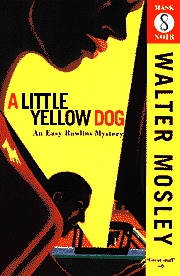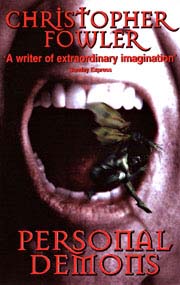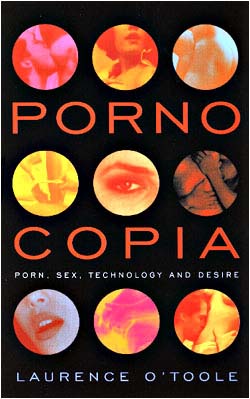
|
July 1998 | Jacket 4 Contents | Homepage | Catalog | Search | Snakes & LaddersPete Ayrton, publisher of Serpent’s Tail books, London, in conversation with Noel King“I mean, if we publish sadomasochistic tales of decay and mutilation, putrefying corpses and the like, everyone’s happy because they can see where these stories fit into the cultural spectrum!” This piece is 2,600 words or about eight printed pages long |
|
|
|
¶ Noel King: It’s four years since we last spoke, and Serpent’s Tail has just celebrated its tenth anniversary: how is the press positioned now? Pete Ayrton: The tenth anniversary has given the media and the bookshops an opportunity to focus on the books we’ve published over that period. The book trade is being very supportive, they’re quite pleased to see an independent publisher thriving after ten years. It’s not like the States here; there are very few independent publishers and as the years go by, there are fewer and fewer. ¶ You’ve started up a “Midnight Classics” series. How did that come about and what are you hoping to do with it?
It was a natural development from our “Mask Noir” series of contemporary crime writing. ¶ Have you any comments on the collapse of the Net Book Agreement? It was a very short-term panic on the part of several of the large publishers who’d had a bad year in 1995 and who thought it would help their sales, especially their pre-Christmas sales if they got rid of the Net Book Agreement. And of course their pre-Christmas sales were excellent but then they always are, and now sales have settled down to patterns which, if anything, are lower than before the Net Book Agreement. Many of the publishers have given away higher discounts and higher margins and so their profits are declining rapidly because the decrease in margins hasn’t been offset by a matching increase in sales. And what they’ve tended to do, which is quite idiotic, is do all the discounting and high margin on front-list books which they’d sell a lot of anyway. |

I think there are possibilities, constructive ways, to use the fact that there isn’t a Net Book Agreement any more, to promote the backlist. For instance, when you bring out a new book by an author you can discount and offer good deals on the backlist, or you can do a “buy two, get one free.” One of the things that’s essential for a publisher like Serpent’s Tail is backlist sales, and one needs to find ways of re-launching and re-presenting backlist titles, because one of the problems when you start is that you don’t have a backlist. You haven’t got the regular sales of old titles, because by definition you haven’t got any. There are things to be done which could be quite interesting, but so far all the large publishers have done is give much higher margins on their best-sellers: it’s only the best-sellers that are discounted. And the amount of books being sold through supermarkets and non-bookstores has increased and obviously this is not in the long-term interest of publishers, certainly not a publisher like Serpent’s Tail that depends on word of mouth from bookstores and bookstore recommendations. We need there to be an intelligent bookstore culture because our books are not going to get recommended in [supermarkets like] Tesco or Asda, let alone sold! ¶ When we last spoke you said that books like Waterstones [a British bookstore chain] had been important to Serpent’s Tail’s success. Has anything altered now that Waterstones have been taken over by W. H. Smith?
Smith’s have got their own stores which are more down market and more high-street, so there’s no reason for them to change the product mix of Waterstone’s. In fact, they’ve left Waterstones alone and they’re doing very well, profits are up and they’re continuing to open stores. So as long as the profit margins remain buoyant it will be fine. ¶ One of your writers, Pagan Kennedy, has been nominated for a prestigious new literary award. Could you give me some information on that? |

It’s been noticed over the years that the percentage of women writers appearing on the shortlist and/ or winning the major literary prizes in the UK has been extremely small. And a lot of influential women in publishing thought that there should be a prize open only to women writers. The prize is coming from a very wealthy, anonymous, benefactor and the sponsor is Orange Mobile Phone Company. The prize has proved extremely controversial because a lot of people, mainly men, have put the predictable argument about ghettoising; you know, why privilege women etc? Financially, this is the largest fiction prize in the UK, it’s 30,000 pounds, and it’s open to English-language women writers from all over the world — Australian, Canadian, American — so the short list is very impressive: Ann Tyler, Maryann Wiggins, Amy Tan, Pagan Kennedy, there are four Americans in the short list. I hope the sponsors are happy at all the coverage they’ve got, both supportive and hostile. But it seems to me the people who use the argument about positive discrimination are always people who don’t want minorities or whatever to have any kind of visibility. Obviously it’s great for us to have one of our new, young writers short listed alongside Amy Tan and Ann Tyler. ¶ How did you come across Pagan Kennedy? We did a collection of short stories, Disorderly Conduct, which was edited by the then literary editor of The Village Voice, Em Mark. That was a collection of stories that had appeared in the Voice Literary Supplement and Pagan Kennedy’s was one of the stories, and it was clear that she was a terrific short story writer. Subsequent to publishing Disorderly Conduct, her agent offered us the collection of stories that became Stripping, and that did really well. And then we did the novel, Spinsters, and that’s done fantastically well. What’s nice is that it’s done well without being the sort of book you necessarily would associate with Serpent’s Tail. I mean, if we publish sadomasochistic tales of decay and mutilation, putrefying corpses and the like, everyone’s happy because they can see where these stories fit into the cultural spectrum! But that can be a problem for us when we publish books that are not located in what’s seen to be our home territory. And this is surprising because all the consumer-research studies show that eighty-five percent of people don’t know the publisher when they buy a book. And yet we seem to be landed with a very strong image-identification, which is a good thing but is also a limiting thing. ¶ What books do you have coming forward in the immediate future?
We’re continuing to publish new books by writers we’ve already published. We’re doing a new book by Neil Bartlett, Mr Clive and Mr Page. And we’re doing a new book, Wavewalker, by Stella Duffy. The crime list has really taken off since we last talked. It started with the whole P. D. James controversy. P.D. James gave this interview to the World Service of the BBC — which, you know, you’re not meant to listen to in the UK. It went out at 3.30 or so in the morning, broadcast for Latin America or somewhere, and she made the point that the middle classes were the suitable subject for crime fiction because the working classes didn’t make moral choices. Regardless of what one thinks of what she said, it certainly led to a loud and controversial debate over the nature of crime writing, who are its protagonists, who are its natural subjects. And obviously there is a recognition that the UK is changing as a society, it’s becoming multi-ethnic, whole hierarchies are disintegrating and contemporary crime writing has to reflect this changing reality of contemporary British cities. And the literary traditions of the cosy, the rural inspector, no longer seem adequate for the genre to cover the reality of British life. |
| |

|
|
It’s interesting that a lot of the people we publish make films, write reviews, do journalism, write novels, make videos, make ads, rap once a week. There’s a way in which creative people nowadays feel less bound to particular art forms than they have over the last twenty or thirty years. If you think of the way someone like Tarantino is influenced by writers and influences writers, how a lot of writers make films or are interested in films and video, it means that there is a lot of cross-fertilisation across the different art forms and genres, and this is reflected in the variety of different forms used by the people we publish. ¶ Do translations still figure as strongly in your list? We don’t do as many translations as we used to do. This isn’t a choice so much as a response to the fact that, in the UK, translations are very hard to sell. ¶ Why? Because people write in English all over the world — England, the US, Canada, the West Indies, Australia, Africa — if an English-language reader wants to read a foreign writer, there are plenty of people writing in English. For a Canadian you can read an English writer and vice versa whereas the same situation doesn’t exist in France or Italy. There, if you want to read a foreign writer you have to read in translation. Another problem is that translaters in England are poorly paid and a lot of translations on the market are of poor quality and this can be off-putting. It’s also true of the thrillers and a lot of other books we publish that they have urban settings and there can be a lot of dialect or slang. This does present phenomenal difficulties for a translator. We’ve done Didier Deininckx, Pieke Biermann, Manuel Vasquez Montalban, but they all present tremendous difficulties and challenges for the translators because the strength of a lot of their writing is the richness of the idiom, and it’s not easy to find ways of reproducing that. It’s also true of this country that there is a tremendous cultural imperialism that is not helpful: it’s not as if, politically and culturally, this country is looking to Europe with much enthusiasm! So in a way the situation has become even more difficult over the last three or four years. ¶ One of your new works is called, intriguingly, Hallucinating Foucault. And you’ve got a first novel from John Williams who’s written a book on American crime writers, Into the Badlands. Patricia Duckworth’s Hallucinating Foucault manages to say profound things about insanity and the nature of fiction, the relationship between writer and reader, and also tell a great story. Next spring we’re publishing a novel by John L. Williams, called Faithless, which is an excellent London novel about a certain generation of rock musicians, people who work in record shops and so on, and what happens when time marches on and leaves them stranded: it covers that phenomenon of the disappearing illusions of a generation. ¶ I’ve been struck by the prominence given in various US and UK bookstores to a category called “Cult Fiction” — and obviously your “Midnight Classics” series works in with that categorisation. Specifically I’m struck by an enlivened attention that is being given to the Beats and Beat Culture. There are impressive, new glossy books, there are reprints of the various Kerouac novels and the poetry of Ginsberg et al. I’m not suggesting that they ever really went away, but they’ve certainly acquired a new level of visibility. Coppola’s film of On the Road is due soon, and Barry Gifford did a screenplay for that (having earlier co-written an oral memoir of Kerouac). Can you provide a publisher’s perspective on this phenomenon? Obviously, generations discover/ rediscover writers. And every generation feels the need to go on the road. A whole generation rediscovered William Burroughs through David Croneneberg’s film of The Naked Lunch and the major exhibition of his work in New York. We’ve just done a book by William Burroughs, Ghost of Chance and it’s done really well. What’s extraordinary is the fact that he places ecological concerns in a very moving tale about the plight of humans. This fits very well into an eco-sensitivity and so Burroughs is rediscovered from that perspective. In relation to the Beats, it’s always been clear that there were women Beats who have been written out of that history and next year we’re publishing an anthology of twenty or thirty pieces from these women. I hope it will surprise people who think of the Beats as a male phenomonon. ¶ Have you any comments on the “laddism” that is back in fashion in the UK? You had the Nick Hornby Fever Pitch phenomenon and there’s now a new generation of magazines like Maxim and Loaded that celebrate “laddism” and “male values” which would have been inconceivable ten years ago. But now lads are encouraged to be laddish and drink a lot of lager and do their thing without feeling guilty about it. ¶ You’re doing a novel by Stewart Home, Slow Death, which seems a bit controversial. He’s a political writer in the tradition of people like Richard Allen who wrote skinhead novels in the 1950s. It’s a very unadorned, in-your-face writing which overlaps with some of the views and positions on masculinity, which are changing — or reverting! —very rapidly. |
|
Noel King teaches in The Faculty of Humanities at the University of Technology, Sydney |
|
Jacket 4 — July 1998
Contents page This material is copyright © Noel King, Pete Ayrton
and Jacket magazine 1998 |